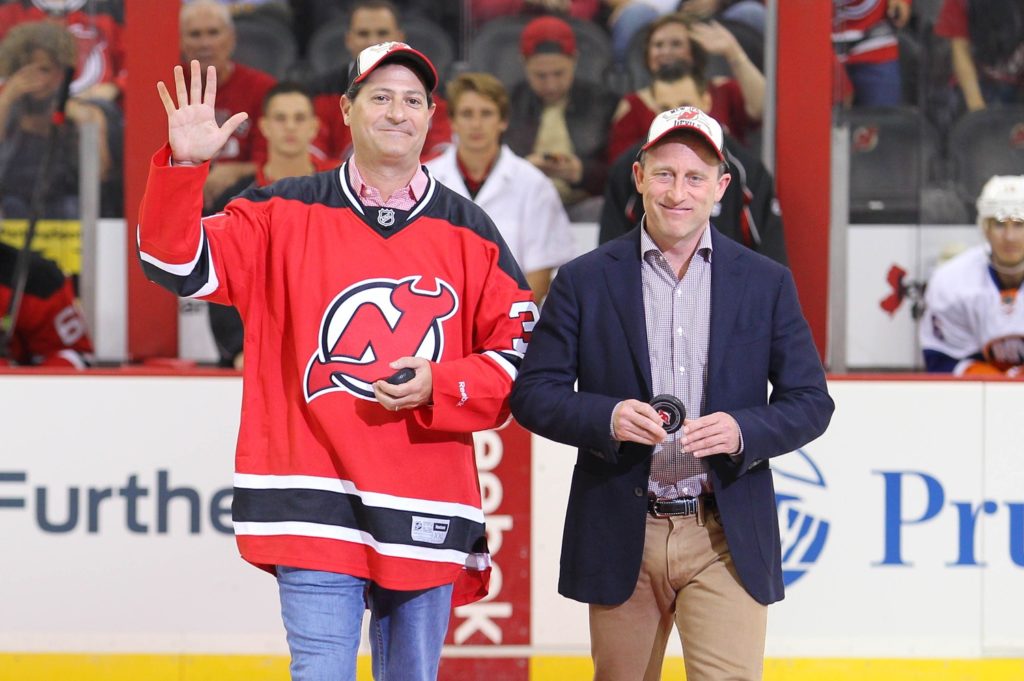Ad Disclosure
Josh Harris and David Blitzer are Getting Into the Empire Business

This came out on Monday, but we missed it while we were knee-deep in Eagles stuff.
In season five of “Breaking Bad,” Walter White tells Jesse Pinkman that he isn’t in the meth selling business, he’s in the “empire” business.
That’s the gist I get from Josh Harris and David Blitzer, who are organizing their current holdings to position for the future.
The Sixers owners announced this week the formation of “Harris Blitzer Sports & Entertainment,” which allows the pair to unify all of their assets under one umbrella.
From the press release:
“HBSE creates a vehicle for Harris and Blitzer to accelerate growth of their holdings through focused resources across their properties, while intensifying exploration of strategic investment opportunities.”
Translation: We’re gonna get bigger and better and buy more stuff.
Sixers CEO Scott O’Neil will double as HBSE’s CEO. Devils President Hugh Weber will serve in the same capacity for the new organization. It’s a natural step for Harris and Blitzer, who have always shown business ambition and savvy while doing things a little bit differently. None of their sports teams are competitive (yet), but that’s beside the point.
https://twitter.com/CFJastrzembski/status/878390931652849666
These are the properties included in Harris Blitzer Sports & Entertainment:
- Philadelphia 76ers
- New Jersey Devils
- Delaware 87ers
- Binghamton Devils (AHL)
- Team Dignitas (esports)
- Sixers Innovation Lab
- Prudential Center (including the attached GRAMMY experience museum)
Not listed is English Premier League club Crystal Palace, which Harris and Blitzer co-own (they each have an 18% stake). Palace is currently dead last in the EPL with zero wins and six losses. They haven’t scored a single goal this season, fired their manager after four games, and are already facing a long and difficult relegation battle. There’s no “Trust the Process” overseas when on-field struggles are rewarded with a division two demotion.
Crystal Palace in the league this season:
❌ Games: 6
❌ Lost: 6
❌ Goals scored: 0
❌ Goals conceded: 13
❌ Points: 0 pic.twitter.com/Ts8uU3w8nC— Football Tweet ⚽ (@Football__Tweet) September 23, 2017
As for HBSE, this is the same template followed by Phil Anschutz (AEG), who owns the LA Kings, LA Galaxy, StubHub Center, and a bunch of other sports and entertainment properties. Stan Kroenke owns the Rams/Nuggets/Arsenal/etc under the umbrella of “Kroenke Sports and Entertainment.” You could make a local comparison with Comcast Spectacor as well, who own the Flyers, the Wells Fargo Center, and a pair of expansion teams in the ECHL and NLL, though they are a subsidiary of Comcast.
This move positions Harris and Blitzer to streamline what they have and acquire additional properties at the same time. It should be noted that some elements of the group are already streamlined (O’Neil is Devils CEO as well). While many people point to Harris’ hedge fund background as a reason to believe that he might cash out on the Sixers in the coming years, a colleague pointed out to me that this umbrella thing would allow the pair to be part of an exclusive club of sports owners. It’s interesting to think about.
The creation of HBSE did result in changes to the Sixers front office.
Chief Sales and Marketing Officer Chris Heck was promoted to President of Business Operations. According to the release, Heck led the Sixers to “a number one ranking in new season ticket sales, doubled the new season ticket member fan base, and increased corporate partnerships by 30 percent annually.” Heck was also part of the deal to land the StubHub jersey sponsorship. He played a role in the acquisition of Team Dignitas and sits on the board with the Sixers Youth Foundation and Sixers Innovation Lab. He also ran point on many of the Sixers’ recent branding initiatives, including the updated court and uniforms, which we’ve given high praise.
The franchise also made three other promotions:
- Lara Price – Chief Operating Officer
- Jake Reynolds – Chief Revenue Officer
- Katie O’Reilly – Chief Marketing Officer
Kyle: Harris has always run the Sixers (and Devils) in a unique way. They have been on the cutting edge in a number of areas– daily fantasy sponsorships, selling tickets exclusively through StubHub, jersey sponsorship, buying an e-sports team, and, more obviously, tanking. They’re built to be the sports organization of the future. At times those moves have seemed to have a disregard for the fan base, and some initiatives crossed the line into contempt for the little guy. But it’s hard to argue with where the Sixers are today: Three promising young stars, a state-of-the-art practice facility, excellent branding, a sustainable ticketing partnership, and other strong business relationships. You can’t really argue with that.
Kevin has been writing about Philadelphia sports since 2009. He spent seven years in the CBS 3 sports department and started with the Union during the team's 2010 inaugural season. He went to the academic powerhouses of Boyertown High School and West Virginia University. email - k.kinkead@sportradar.com